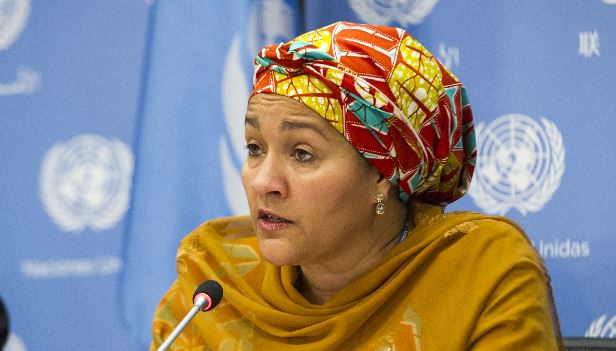The United Nations Deputy Secretary-General, Amina Mohammed, has charged African defense chiefs to forge stronger regional cooperation in tackling the continent’s multiplying security threats, warning that terrorism, climate change, and emerging technologies such as artificial intelligence (AI) are reshaping Africa’s peace and security landscape.
Speaking at the first-ever African Defense Chiefs Conference held in Abuja, Mohammed described the gathering as “the birth of a new era in African security cooperation” and called for urgent, united action to confront shared challenges.
“Nearly one in every five people on earth call Africa home. Each one deserves a life in safety and in dignity. That means protecting civilians, respecting borders, and standing by the principles of international law and the UN Charter. Above all, it calls for a united approach against our common threats.”
She warned that Africa remains the epicenter of global terrorism deaths, with extremist groups exploiting technology and deepening instability across regions.
“Al Qaeda and the Islamic State affiliates coordinate across our continent, and the attacks in West Africa coastal countries have surged 250 percent in two years. By last year’s end, over 14,000 schools were closed in the central Sahel due to conflict. When young people see no path to education or justice, extremist propaganda finds an audience, and we risk losing an entire generation.”
Mohammed also raised concerns over how advanced technologies, including AI, are being weaponized.
“Cyberspace today is now a battle space. Elections are manipulated; institutions undermined and lies spread until neighbor turns against neighbor. Artificial intelligence is already transforming the landscape of security. The same technology that offers solutions also carries profound risks. AI-enabled cyber-attacks could cripple entire infrastructure and paralyze essential services.”
Turning to the climate crisis, the UN Deputy Secretary-General described climate change as a “clear and present danger to peace” in Africa. She emphasized that organized crime and maritime insecurity are compounding threats to continental stability.
“Shrinking water levels in the Lake Chad Basin have displaced over three million people. Extreme heat, sea level rise, and shifting rainfall patterns are driving displacement, exacerbating resource competition, and fueling instability. Climate change is a threat multiplier that fuels conflict, displaces populations, and undermines state stability.”
“Our seas are becoming a new front line. Organized crime on our waters is feeding violence on our land. In the Gulf of Guinea, piracy and illicit trade are funding terrorism, while in the Red Sea, maritime insecurity is undermining stability far beyond the shoreline.”
While acknowledging Africa’s diversity and complexity, Mohammed said existing regional efforts, including the Multinational Joint Task Force in the Lake Chad Basin, ECOWAS interventions, IGAD, and the G5 Sahel, demonstrate the continent’s capacity for joint security responses.
“When we act in isolation, we hand our adversaries their greatest advantage, our division. Regional cooperation is the linchpin of African security and defense. Collaboration must be targeted and intentional.”
She outlined three key areas where African unity could “tip the balance”: pooled resources, intelligence and innovation, and strengthening people and partnerships.
“Pooling our budgets for joint responses makes us stronger than scattering the spending. We need the right tools and mapping in place to ensure data becomes decisions. And we must unite the public and private sectors—soldiers learning side by side with engineers, technicians, and innovators. This is how Africa’s own labs and companies empower our security future.”
Mohammed reminded defense chiefs that Africa is not merely a beneficiary of international security aid but a key global contributor.
She further stressed the critical role of women and young people in building sustainable peace.
“Today, nine of the world’s top 15 contributors of UN peacekeeping are African nations. Without African leadership, there would be no effective peacekeeping. African crises demand African leadership, backed by global financial support, for African solutions to succeed.”
“On the day after, women are the anchors of recovery, helping to rebuild trust and heal communities long after the guns fall silent. We must see women not only as victims of war, but as partners in peace. Just as women are the bedrock of peace in our homes, they must be part of the search for peace on the war front.”
“Let us perhaps remind ourselves that terrorists are not born, they are our children, young people who have gone badly astray. It is our duty to bring them back out from the cold into building their nations, not destroying them.”
Drawing a link between security and development, Mohammed cautioned that military spending alone cannot deliver lasting peace.
“Last year, the world spent $2.7 trillion on the military, more than at any point in history. Yet insecurity has not diminished. At the same time, the world fell short by $4 trillion each year for basic development needs. That imbalance raises a clear question: what kind of spending truly delivers the peace you are willing to protect?”
She reiterated that without peace, neither the United Nations’ Sustainable Development Goals (SDGs) nor the African Union’s Agenda 2063 can be achieved.
“Farmers cannot farm without security. Energy systems cannot be built without being protected. Every school, every hospital depends on security. Without security, development is impossible. Without development, security cannot hold.”
Calling for courage, trust, and shared resolve, Mohammed urged African defense leaders to act decisively in shaping the continent’s future.
“This is not about winning wars. It is about winning peace and doing it together. Our voice must be heard beyond this room, carried into every international forum where decisions on defense are made. That is how we will shape Africa’s security on Africa’s terms.”

